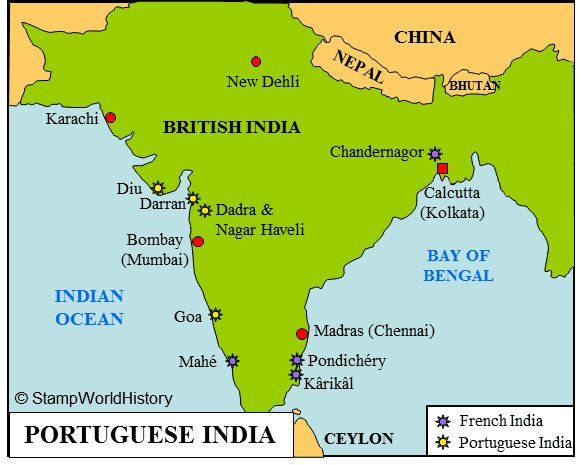Merger of French and Portuguese Territories | 15 Oct 2024
For Prelims: French and Portuguese Territories, Brazzaville Conference, French Congo, Africa, Article 27, Goa, Salazar, North Atlantic Treaty Organisation (NATO), Tristão de Bragança Cunha, Operation Vijay, Azad Gomantak Dal (AGD), Students Congress of French India, French Indian National Congress.
For Mains: Contrasting approaches of the French and Portuguese colonial powers in retaining their Indian territories after India's independence.
Why in News?
On 1st November 1954, the French possessions in India were transferred to the Indian Union and Puducherry became a Union Territory.
- On 19th December, India will celebrate Goa Liberation Day to commemorate the state's liberation from Portuguese rule in 1961.
- With prolonged negotiations, nationalist movements and military action, India succeeded in integration of French and Portuguese territories in India.
Why France Insisted on Retaining its Colonies in India?
- Post- World War II Reconstruction: The French government believed that the empire would help revitalise the nation's post-war reconstruction using colonial resources and strengthening its global influence.
- Brazzaville Conference (1944): The Brazzaville Conference held in 1944 in French Congo led to the concept of the French Union.
- It would integrate colonies more directly into the French political system, allowing them to remain part of France under a redefined relationship.
- Democratic Rights: Article 27 of the constitution of the French Union offered its colonies the choice to either stay with France or become independent.
- France was portrayed as a liberal and progressive colonial power which was used to prolong its hold over its colonies.
- Cultural and Linguistic Influence: Many residents in French India spoke French, not English, and felt culturally aligned with France rather than the new, English-speaking independent India.
- Strategic and Political Calculations: For the French government, whatever happened in India was to have its repercussions in their other colonies in Indochina and Africa. Consequently, their motive was to prolong the process of negotiation as much as possible.
Note:
In India, French colonies comprised Pondicherry, Mahe, Chandernagore, Karaikal, and Yanon (Yanam).
Why Portugal Insisted on Retaining its Colonies in India?
- Historical Claim: Portugal emphasised its centuries-long presence in Goa, having ruled the territory since the early 16th century unlike more recently established British or French colonies.
- Goans substantially were voting for their representatives in the Portuguese Parliament from the 19th century.
- Salazar’s Dictatorial Stance: Portuguese dictator Salazar viewed Portugal’s colonies not as temporary possessions but as integral parts of the Portuguese state and declared Goa and other Indian territories as overseas provinces.
- This stance made decolonisation unthinkable in his view, as it would be tantamount to the disintegration of Portugal’s territorial integrity.
- Geopolitical Leverage: Portugal’s membership in the North Atlantic Treaty Organisation (NATO) provided a deterrent against India’s attempts to use force for Goa’s liberation.
- Strategic Significance of Goa: Goa’s strategic location on the western coast of India gave Portugal a foothold in South Asia and was viewed as a valuable asset for maintaining Portuguese influence in the region.
- Catholic Population: Portugal argued that the Goan Catholic population would not be safe in a predominantly Hindu-independent India.
- This was a strategic move to gain international sympathy by implying that Portuguese withdrawal would expose religious minorities to persecution.
Note:
The Portuguese colonies in India included Daman, Diu, Goa, Ilha de Angediva, Nagar Haveli and Panikota.
How did the French and Portuguese Territories Merge with India Differently?
| Aspect | French Colonies | Portuguese Colonies |
| Colonial power stance |
|
|
| Local population’s reaction |
|
|
| Role of nationalist movements |
|
|
| Key events |
|
|
| Mode of transfer |
|
|
| International influence |
|
|
| Indian government’s role |
|
|
Conclusion
The decolonization of French and Portuguese territories in India highlighted contrasting approaches—diplomatic negotiation versus armed conflict. While French India saw a peaceful transition, Portugal's refusal to cede Goa led to military action. Both processes were pivotal in shaping India's post-independence territorial unity and inspired further global decolonization.
|
Drishti Mains Question: Examine the contrasting approaches of the French and Portuguese colonial powers in retaining their Indian territories after India's independence. |
UPSC Civil Services Examination, Previous Year Questions (PYQs)
Prelims
Q. Consider the following statements: (2021)
- St. Francis Xavier was one of the founding members of the Jesuit Order.
- St. Francis Xavier died in Goa and a church is dedicated to him there.
- The Feast of St. Francis Xavier is celebrated in Goa each year.
Which of the statements given above are correct?
(a) 1 and 2 only
(b) 2 and 3 only
(c) 1 and 3 only
(d) 1, 2 and 3
Ans: (c)
Q.Consider the following events: (2018)
- The first democratically elected communist party government formed in a State in India.
- India’s then largest bank, ‘Imperial Bank of India’, was renamed ‘State Bank of India’.
- Air India was nationalised and became the national carrier.
- Goa became a part of independent India.
Which of the following is the correct chronological sequence of the above events?
(a) 4 – 1 – 2 – 3
(b) 3 – 2 – 1 – 4
(c) 4 – 2 – 1 – 3
(d) 3 – 1 – 2 – 4
Ans: (b)

